When it comes to picture-perfect tropical destinations, Boracay is often at the top of the list. But have you ever wondered where exactly this paradise island is located? Is it in Aklan, as the title suggests? The answer might surprise you. Let’s dive into the details and uncover the truth about Boracay’s location.
Boracay Island is indeed located in Aklan, a province in the Western Visayas region of the Philippines. Situated just 0.8 kilometers off the northwest coast of Panay Island, Boracay offers breathtaking white sand beaches and crystal-clear waters that attract tourists from all over the world. With a land area of 10.32 square kilometers, Boracay is under the jurisdiction of three barangays in Malay, Aklan. As of 2020, the island had a population of 37,802.
Key Takeaways:
- Boracay is a resort island located in the Aklan province of the Philippines.
- The island is situated 0.8 kilometers off the northwest coast of Panay Island in the Western Visayas region.
- Boracay is famous for its stunning white sand beaches and crystal-clear waters.
- The island has a total land area of 10.32 square kilometers and is under the jurisdiction of three barangays in Malay, Aklan.
- Boracay had a population of 37,802 as of 2020.
Geography of Boracay Island
Boracay Island, situated in the Western Visayas region of the Philippines, is a tropical paradise known for its pristine white sand beaches and crystal-clear waters. It is located approximately 0.8 kilometers off the northwest coast of Panay Island. Spanning about seven kilometers in length, Boracay has a total land area of 10.32 square kilometers.
The island’s unique shape resembles that of a dog bone, with its narrowest point measuring less than one kilometer wide. Boracay is surrounded by the Jintotolo Channel, Sibuyan Sea, Sulu Sea, and Tablas Strait, further enhancing its picturesque coastal charm.
Adventure-seekers and nature enthusiasts can explore the island’s diverse topography, from its pristine beaches to its lush hills and rock formations. Boracay’s geography offers awe-inspiring views and opportunities for exciting activities like hiking, cliff diving, and island-hopping.
| Geographical Features | Description |
|---|---|
| White Sand Beaches | Boracay is renowned for its powdery white sand beaches, including the famous White Beach, which stretches for approximately four kilometers and is divided into three stations. |
| Hills and Rock Formations | The island’s hills offer panoramic views of the surrounding seascape, while its unique rock formations, like Willy’s Rock and Ariel’s Point, add to its natural charm. |
| Coastal Waters | The azure waters surrounding Boracay are home to diverse marine life, making it an ideal destination for snorkeling, diving, and other water sports. |
| Diverse Flora and Fauna | Boracay’s geography supports a variety of plant and animal species, contributing to its rich biodiversity and ecological significance. |
With its captivating geography, Boracay Island offers visitors a remarkable blend of natural beauty and adventure, making it a sought-after destination for travelers seeking an unforgettable tropical getaway.
History of Boracay
Boracay Island has a fascinating history that spans pre-colonial times to the present day. The island was originally inhabited by the indigenous Ati people, who called it their home for generations. When Spanish conquerors arrived in the 16th century, they named the island “Buracay.” At that time, the population of Buracay consisted of around one hundred people engaged in rice cultivation and goat farming as a means of income.
During the contemporary period, Boracay was part of the province of Capiz before becoming a part of Aklan. Before tourism took over, Boracay primarily relied on agriculture, with industries such as copra production and fishing being prominent in the local economy.
“Boracay has a rich history that reflects the resilience and ingenuity of its people. From its indigenous roots to its transition into a tourist destination, the island’s past is an integral part of its identity.”
Over time, Boracay’s allure as a tropical paradise attracted travelers from around the world, leading to its transformation into one of the Philippines’ most popular tourist destinations. Today, Boracay stands as a testament to the harmonious coexistence of its cultural heritage and the vibrant tourism industry that sustains it.
| Year | Historical Event |
|---|---|
| 16th century | Spanish conquerors arrive and name the island “Buracay” |
| Contemporary period | Boracay becomes part of Aklan after being a part of Capiz |
| 1970s | Tourism begins to flourish in Boracay |
| 1997 | Boracay faces a decline in tourist arrivals due to environmental concerns |
| 2018 | Boracay undergoes a major renovation and closure for environmental rehabilitation |
Boracay’s history is a testament to its adaptability and resilience. From its humble beginnings as a small agricultural community to its current status as a world-renowned tourist destination, Boracay Island has undergone remarkable transformations while retaining its cultural heritage. It is this unique blend of the past and present that adds to the charm and allure of Boracay, making it a destination that captures the hearts of visitors from all walks of life.
Development of Tourism in Boracay
Tourism in Boracay began to thrive in the 1970s, captivating tourists from the West after German writer Jens Peter referred to it as a “paradise on Earth” in his book about the Philippines. The island swiftly became popular as a budget-friendly destination for backpackers in the 1980s and garnered worldwide recognition for its pristine beaches in the 1990s. However, in 1997, Boracay experienced a decline in tourist arrivals due to environmental concerns, particularly inadequate sewage and septic systems.
Efforts were promptly initiated to improve the island’s infrastructure and environmental conditions. Notably, the installation of a water supply and sewage treatment plant played a significant role in addressing the issues. These developments aimed to ensure a sustainable tourism experience for visitors and preserve the natural beauty that makes Boracay a remarkable destination.
Tourism Milestones in Boracay
- 1970s: Increased appeal to Western tourists
- 1980s: Rise as a popular budget destination for backpackers
- 1990s: Recognition for having some of the best beaches in the world
Environmental Concerns
In 1997, Boracay faced challenges due to inadequate sewage and septic systems. These issues impacted the island’s ecosystem and raised concerns about its long-term sustainability.
“The quality of the environment does not mean only cleanliness, but also the quality of life that people experience.” – Department of Tourism
Infrastructure Improvements
To combat the environmental concerns, Boracay implemented various measures to ensure the well-being of the island. Notable improvements included the installation of a water supply and sewage treatment plant, which greatly enhanced the infrastructure and addressed the issues at hand. These initiatives aimed to provide a better experience for tourists while preserving the natural beauty of Boracay.
The Ongoing Journey
Boracay continues to strive towards sustainable tourism and environmental preservation. The island’s commitment to maintaining a balance between visitor satisfaction and ecological harmony showcases its dedication to ensuring a bright future for Boracay’s tourism industry.
For further information, please refer to the table below:
| Year | Developments |
|---|---|
| 1970s | Increased appeal to Western tourists |
| 1980s | Rise as a popular budget destination for backpackers |
| 1990s | Recognition for having some of the best beaches in the world |
| 1997 | Environmental concerns due to inadequate sewage and septic systems |
| 2000s | Infrastructure improvements, including water supply and sewage treatment plant |
Boracay’s Rehabilitation and Recognition
In 2018, the Philippine government under President Rodrigo Duterte implemented a six-month closure of Boracay for major renovation works, including the upgrade of the sewage system. The closure aimed to address the environmental issues on the island and ensure its long-term sustainability.
After the reopening in October 2018, Boracay has received numerous accolades for its rehabilitation efforts. It was awarded as the Best Island in the World by Travel + Leisure in 2012 and topped Condé Nast Traveler’s list of Best Islands in the World in 2014. The island continues to attract tourists with its pristine beaches and sustainable tourism practices.
Boracay’s Revival Amidst the Pandemic
Despite the challenges posed by the COVID-19 pandemic, Boracay has successfully reopened to tourists. The island’s recovery and restoration efforts have made it a “paradise reborn,” as recognized by Time Magazine’s World’s Greatest Places list in 2022. The closure of Boracay in 2018 allowed the island’s marine life and natural beauty to thrive, leading to a resurgence of flora and fauna. With the implementation of COVID-19 protocols, visitors can once again enjoy the breathtaking beaches and hospitality that Boracay has to offer.
When the COVID-19 pandemic hit, the world came to a standstill, and tourism was one of the hardest-hit sectors. Boracay, like many other destinations, had to temporarily close its doors to ensure the safety of both visitors and residents. However, the closure allowed the island to undergo significant restoration efforts and implement necessary measures to protect the environment and enhance the overall visitor experience.
Boracay’s revival amidst the pandemic is a testament to the resilience and adaptability of the tourism industry. The island’s successful reopening is a result of stringent health protocols, including regular testing, contact tracing, and enhanced sanitation measures. These measures are in place to ensure the safety of both tourists and the local community, allowing everyone to enjoy all that Boracay has to offer while mitigating the risks of COVID-19 transmission.
With its stunning white sand beaches and crystal-clear waters, Boracay has once again become a sought-after destination for beach lovers and nature enthusiasts. Visitors can indulge in a wide range of water activities, such as snorkeling, diving, and island hopping, while taking in the natural beauty and serenity of the island.
“Boracay’s revival amidst the pandemic is a testament to the resilience and adaptability of the tourism industry.”
The closure of Boracay in 2018 not only allowed the island’s marine ecosystem to recover but also gave way to the resurgence of lush greenery and thriving flora and fauna. Visitors can now witness the island’s natural wonders in their full glory, with vibrant tropical vegetation and an abundance of wildlife. Boracay’s preservation efforts have transformed it into a paradise that is not only visually stunning but also environmentally sustainable.
The recognition by Time Magazine’s World’s Greatest Places list in 2022 further solidifies Boracay’s position as a global tourism gem. It serves as a testament to the island’s commitment to sustainable tourism practices, responsible travel, and the preservation of its natural beauty and cultural heritage.
Boracay’s revival amidst the pandemic offers a glimmer of hope and a shining example of how destinations can overcome challenges and emerge stronger. With its breathtaking beaches, rich marine life, and warm Filipino hospitality, Boracay continues to welcome visitors from around the world to experience a true tropical paradise.
Attractions and Activities in Boracay
Boracay Island offers an array of attractions and activities that will delight every traveler. The highlight of the island is its stunning white sand beaches, with White Beach being the most famous for its mesmerizing sunsets. Spend your days basking in the sun, building sandcastles, or simply relaxing by the crystal-clear waters.
For those seeking adventure, Boracay provides an exciting menu of water activities. Dive into the vibrant underwater world with snorkeling or scuba diving expeditions. Soar through the sky with parasailing or explore the depths of the ocean with helmet diving. The possibilities are endless.
Prefer to stay on land? Boracay has plenty of options for you too. Tee off at the world-class golf courses or embark on exhilarating mountain biking adventures through picturesque trails. Experience the thrill of riding ATVs and explore the island’s hidden gems.
After a day of excitement, why not indulge in some relaxation? Treat yourself to soothing massages and spa treatments that will rejuvenate your mind and body. Let go of all your worries as trained therapists pamper you with a wide range of treatments.
When the sun sets, Boracay comes alive with its vibrant nightlife. Immerse yourself in the lively atmosphere of the island’s bars and clubs. Dance the night away to the latest beats, indulge in delicious cocktails, and create lifelong memories with new friends.
Visiting Boracay is like stepping into a paradise where endless adventures and unforgettable experiences await. From relaxing on pristine beaches to engaging in thrilling activities and enjoying a vibrant nightlife, there is something for everyone on this beautiful island.
The Top Attractions and Activities in Boracay
| Attractions | Activities |
|---|---|
| White Beach | Snorkeling |
| Puka Shell Beach | Scuba Diving |
| Mount Luho | Parasailing |
| Crystal Cove Island | Helmet Diving |
| Willy’s Rock | Golfing |
| Bulabog Beach | Mountain Biking |
| Dead Forest | ATV Rides |
| Dmall | Massages and Spa Treatments |
| Bars and Clubs | Nightlife Entertainment |
Whether you’re seeking relaxation, adventure, or a vibrant nightlife, Boracay has it all. Explore the island’s breathtaking attractions and engage in thrilling activities that will create unforgettable memories. Discover why Boracay is a top destination for travelers from around the world.
Boracay’s Culinary Delights
Boracay is not only known for its stunning beaches but also for its culinary delights. The island offers a diverse range of cuisines to cater to different tastes. Visitors can indulge in fresh seafood dishes, Filipino delicacies, international cuisine, and fusion dishes.
The local seafood market is a must-visit for seafood enthusiasts, where they can choose from a variety of freshly caught seafood and have it cooked to their liking. From succulent grilled prawns to mouthwatering fish dishes, the seafood in Boracay is a treat for the taste buds.
In addition to seafood, Boracay’s dining scene also includes beachfront restaurants, cafes, and food stalls serving both local and international fare. Whether you’re in the mood for a traditional Filipino dish like adobo or kare-kare, or you’re craving a taste of home with a burger or pizza, Boracay has it all.
Island-Inspired Flavors
One of the highlights of the culinary experience in Boracay is the use of fresh and local ingredients. Many restaurants on the island source their produce from nearby farms, ensuring that meals are packed with flavor and quality.
For those looking to try traditional Filipino dishes, the island provides a range of options. From sinigang (a sour soup typically made with tamarind), lechon (roast pig), to halo-halo (a delicious dessert made with shaved ice, sweet beans, fruits, and more), Boracay offers a taste of authentic Filipino cuisine.
Dining with a View
When it comes to dining in Boracay, the view is just as important as the food. Many restaurants and cafes offer stunning views of the beach, allowing visitors to enjoy a meal while taking in the beauty of the ocean.
Whether you choose to dine at a beachfront restaurant or enjoy a meal at a seafood shack with your toes in the sand, the ambiance adds to the overall dining experience in Boracay. From casual eateries to fine dining establishments, there’s something to suit every taste and budget.
Must-Try Dishes in Boracay
| Dish | Description |
|---|---|
| Fresh Grilled Seafood | Choose from an array of freshly caught seafood and have it grilled to perfection. |
| Chicken Inasal | Tender and juicy grilled chicken marinated in a flavorful blend of spices. |
| Chori Burger | A Boracay specialty featuring a grilled chorizo patty topped with cheese and served on a bun. |
| Calamansi Muffins | Delightful muffins infused with the tangy flavor of calamansi, a local citrus fruit. |
| Mango Pizza | A unique combination of sweet and savory flavors, topped with juicy mango slices. |
Boracay’s culinary scene truly offers something for everyone. Whether you’re a seafood lover, an adventurous eater, or simply looking to indulge in delicious dishes, you’ll find it all on this tropical island. So, don’t miss the opportunity to explore the diverse and mouthwatering flavors of Boracay’s cuisine during your visit.
Accommodation Options in Boracay
Boracay offers a wide range of accommodation options to suit every traveler’s needs and preferences. Whether you’re looking for a budget-friendly stay or a luxurious retreat, the island has something for everyone. From resorts and hotels to guesthouses, there are plenty of choices to make your stay in Boracay memorable.
One of the most popular areas to stay in Boracay is along the famous White Beach. Here, you’ll find a variety of resorts and hotels that offer stunning views of the beach and easy access to its pristine shores. Imagine waking up to the sound of waves and stepping outside to feel the soft, powdery sand beneath your feet.
When it comes to accommodation types, you’ll find a variety of options to choose from. Standard rooms are perfect for travelers seeking a comfortable and affordable stay. Suites offer more space, with separate living areas and upgraded amenities. For those who prefer a more luxurious experience, villas provide the ultimate in privacy and indulgence.
Many of the resorts in Boracay go the extra mile to ensure a memorable stay for their guests. Some offer private pools, where you can relax and unwind in a tranquil setting. Others provide spa services, allowing you to pamper yourself with rejuvenating treatments. And for those who love dining with a view, beachfront restaurants offer delicious meals while enjoying the breathtaking scenery.
Top Accommodation Options in Boracay:
- Hotel Name 1: Located along White Beach, this hotel offers spacious suites with stunning ocean views. Indulge in their world-class spa and enjoy beachfront dining at their renowned restaurant.
- Resort Name 2: Situated in a secluded area, this luxury resort features private villas with plunge pools and personalized butler service. Immerse yourself in the lap of luxury and enjoy the serenity of your own private oasis.
- Guesthouse Name 3: Perfect for budget-conscious travelers, this charming guesthouse offers cozy rooms just a short walk from White Beach. Experience warm Filipino hospitality and enjoy the laid-back atmosphere of the island.
With its diverse range of accommodation options, Boracay ensures that every traveler can find the perfect place to stay. Whether you’re seeking relaxation, adventure, or a combination of both, the island’s accommodations provide a comfortable and enjoyable base for your unforgettable Boracay experience.
Getting to Boracay
To experience the stunning beauty of Boracay, you first need to make your way to the nearby town of Caticlan on Panay Island. Caticlan Jetty Port is your gateway to this tropical paradise.
To get to Caticlan, you can take a domestic flight to either Kalibo International Airport or Godofredo P. Ramos Airport. From there, it’s just a short transfer to Caticlan, where your Boracay adventure begins.
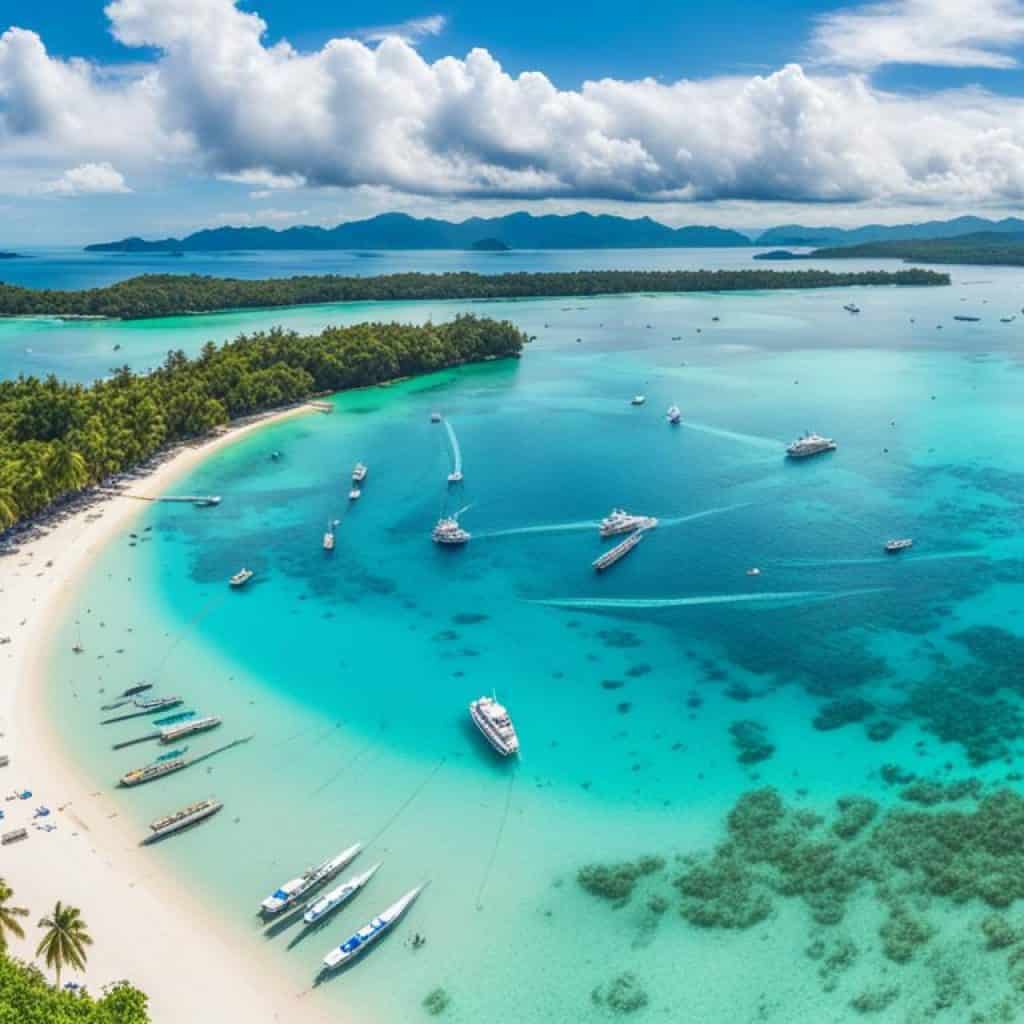
Once you arrive at Caticlan Jetty Port, you’ll find yourself just a boat ride away from the white sand beaches of Boracay Island. Hop on a short boat transfer across the strait, and in no time, you’ll be stepping onto the shores of this tropical paradise.
Once you’ve reached Boracay Island, you have a few options for reaching your accommodation. You can choose to take a tricycle, a popular mode of transportation in the Philippines, or opt for a shuttle service provided by your hotel. Whichever option you choose, you’ll quickly find yourself settled in and ready to make the most of your Boracay getaway.
Sustainability and Responsible Tourism in Boracay
Boracay Island is committed to sustainable tourism and responsible travel practices. As one of the most popular destinations in the Philippines, the island recognizes the importance of minimizing its environmental impact and preserving its natural beauty for future generations.
In order to achieve sustainable tourism, Boracay has implemented various initiatives and policies. The use of biodegradable products is strongly encouraged, reducing the amount of waste that ends up in landfills or pollutes the surrounding marine ecosystem. Additionally, the island has placed restrictions on single-use plastics, such as plastic bags and straws, to minimize pollution and protect the local environment.
Electric tricycles, also known as e-trikes, are a common mode of transportation on the island. These eco-friendly vehicles help reduce air and noise pollution, promoting sustainable transportation options for both locals and tourists. By supporting the use of e-trikes, visitors contribute to the island’s goal of reducing carbon emissions and creating a greener and more sustainable future.
Boracay also encourages responsible travel by promoting the respect of local culture and traditions. Visitors are encouraged to learn about the customs and practices of the Ati indigenous people, who have a distinct cultural heritage on the island. By participating in cultural activities and supporting local businesses, tourists can make a positive impact on the local community and economy.
Responsible tourism goes beyond simply enjoying the beauty of Boracay. It’s about leaving a positive footprint and ensuring the island’s long-term sustainability.
Beach clean-up activities are organized regularly on Boracay, allowing tourists to actively participate in the preservation of the island’s natural beauty. By joining these initiatives, visitors can directly contribute to the cleanliness of the beaches and the protection of marine life.
Benefits of Sustainable and Responsible Tourism
Embracing sustainable and responsible travel practices in Boracay yields numerous benefits. By minimizing environmental impact and promoting eco-friendly initiatives, the island can maintain its pristine beauty, ensuring that future generations can continue to enjoy its natural wonders. Sustainable tourism also supports the local community by creating jobs and economic opportunities, helping to improve the quality of life for residents.
Moreover, responsible travel enhances cultural experiences, allowing visitors to connect with the local community and gain a deeper understanding of the island’s heritage. By respecting and appreciating the local culture, tourists contribute to the preservation of traditions and customs.
Boracay’s commitment to sustainable tourism and responsible travel sets an example for other destinations around the world. By choosing to visit and support destinations that prioritize the environment and local communities, travelers can play a significant role in creating a more sustainable and equitable global tourism industry.
Summary Table
| Initiatives | Impact |
|---|---|
| Use of biodegradable products | Reduces waste and prevents pollution |
| Restriction on single-use plastics | Minimizes plastic pollution and protects the environment |
| Promotion of electric tricycles | Reduces carbon emissions and noise pollution |
| Respect for local culture and traditions | Preserves cultural heritage and supports the local community |
| Organizing beach clean-up activities | Ensures the cleanliness of beaches and protects marine life |
Boracay’s Cultural Heritage
Boracay Island is not only known for its stunning beaches and crystal-clear waters but also for its rich cultural heritage. The island is home to the Ati indigenous people, who have a distinct culture and traditions that have been passed down through generations.
One of the most significant cultural events in Boracay is the Boracay Ati-Atihan festival. This vibrant festival showcases the cultural heritage of the Ati people and attracts a large number of tourists from around the world. The festival features colorful parades, traditional music and dances, and vibrant costumes that reflect the unique identity of the Ati community.
The Boracay Ati-Atihan festival is held annually and has become a major tourism attraction for the island. It is a celebration of the Ati culture and serves as a platform to promote understanding and appreciation of their traditions. Tourists have the opportunity to witness the captivating performances and immerse themselves in the rich cultural heritage of Boracay.
Through events like the Boracay Ati-Atihan festival, the island showcases its commitment to preserving its cultural heritage and promoting cultural tourism. The festival not only provides entertainment but also serves as a platform for cultural exchange and appreciation.
Boracay Island is truly a destination where natural beauty, pristine beaches, and vibrant cultural traditions converge, offering visitors a unique and memorable experience.
Boracay’s Future Developments
Boracay Island is constantly evolving and undergoing development to further enhance its status as a world-class tourism destination. These future plans aim to provide visitors with an unforgettable experience while ensuring the island’s sustainability for future generations.
Improvement of Infrastructure
As part of the future plans, Boracay will focus on improving its infrastructure to meet the growing demands of tourism. This includes the development of better transportation systems, upgraded roads, and enhanced utilities such as water and electricity supply.
Implementation of New Technologies
Boracay recognizes the importance of embracing new technologies to enhance the overall visitor experience. This involves the integration of smart systems, mobile applications, and digital platforms to streamline processes and provide tourists with convenient access to information and services.
Enhancement of Tourism Facilities and Services
To further elevate the tourism experience, Boracay intends to enhance its existing facilities and services. This includes the development of new hotels and resorts to cater to various budgets and preferences, as well as the improvement of amenities such as restaurants, shops, and recreational areas.
Boracay’s future developments aim to strike a balance between meeting the needs of visitors and preserving the island’s natural beauty and cultural heritage. The goal is to create a sustainable and responsible tourism destination that continues to attract tourists from around the world.
By investing in these future developments, Boracay is committed to providing visitors with unforgettable experiences while ensuring the long-term preservation of its pristine beaches, crystal-clear waters, and vibrant culture.
| Future Developments | Benefits |
|---|---|
| Improved infrastructure | Enhanced transportation, utilities, and accessibility |
| New technologies | Convenience and efficiency for tourists |
| Enhanced facilities and services | A wider range of options and improved amenities |
Boracay in Time Magazine’s World’s Greatest Places
Boracay has gained international recognition as one of Time Magazine’s World’s Greatest Places. The island’s restoration and successful reopening to tourists amid the COVID-19 pandemic have earned it the title of “paradise reborn.” Boracay’s rejuvenation after the closure in 2018 and the recovery of its marine life and tourist attractions have impressed travelers and industry experts alike. It has become a symbol of resilience and showcases the beauty and wonders of the Philippines to the world. Being included in Time Magazine’s prestigious list further solidifies Boracay’s status as a global tourism gem.
| Year | Award |
|---|---|
| 2012 | Best Island in the World (Travel + Leisure) |
| 2014 | Best Islands in the World (Condé Nast Traveler) |
| 2022 | Time Magazine’s World’s Greatest Places |
Boracay’s inclusion in Time Magazine’s World’s Greatest Places list is a testament to the island’s enduring appeal and remarkable transformation. After years of rehabilitation efforts and sustainable practices, Boracay has emerged as a top destination for travelers seeking a tropical paradise. Whether it’s lounging on the pristine beaches, exploring the vibrant marine life, or immersing in the rich cultural heritage, Boracay offers a truly unforgettable experience. Its recognition on the world stage further cements Boracay’s status as one of the most breathtaking and sought-after destinations in the world.
Boracay’s Global Acclaim
Boracay Island has garnered widespread recognition and numerous awards for its breathtaking beauty, commitment to sustainability, and exceptional tourism offerings. The island’s outstanding features have propelled it to the forefront of global acclaim, solidifying its position as a world-class destination.
One of the notable accolades bestowed upon Boracay is being named the Best Island in the World by Travel + Leisure in 2012. This prestigious recognition highlights the island’s captivating natural landscapes, pristine beaches, and unforgettable experiences that leave a lasting impression on visitors.
Boracay’s excellence doesn’t end there. The island has also graced the top of Condé Nast Traveler’s list of Best Islands in the World in 2014, further solidifying its reputation as a truly exceptional destination. This recognition speaks volumes about Boracay’s unparalleled beauty and the unparalleled experiences it offers to travelers from around the globe.
Moreover, Boracay has been lauded for its dedication to sustainable tourism practices. The island was honored with a United Nations prize for practicing sustainable tourism in the new normal. This recognition underscores Boracay’s steadfast commitment to preserving its natural resources, implementing eco-friendly initiatives, and ensuring a harmonious coexistence between tourism and the environment.
These esteemed awards and recognitions are a testament to Boracay’s tireless efforts in maintaining its pristine natural surroundings, delivering unforgettable vacation experiences, and setting an exemplary standard for sustainable tourism. The island’s commitment to excellence and responsible practices continues to captivate visitors, establishing it as a global leader in the tourism industry.
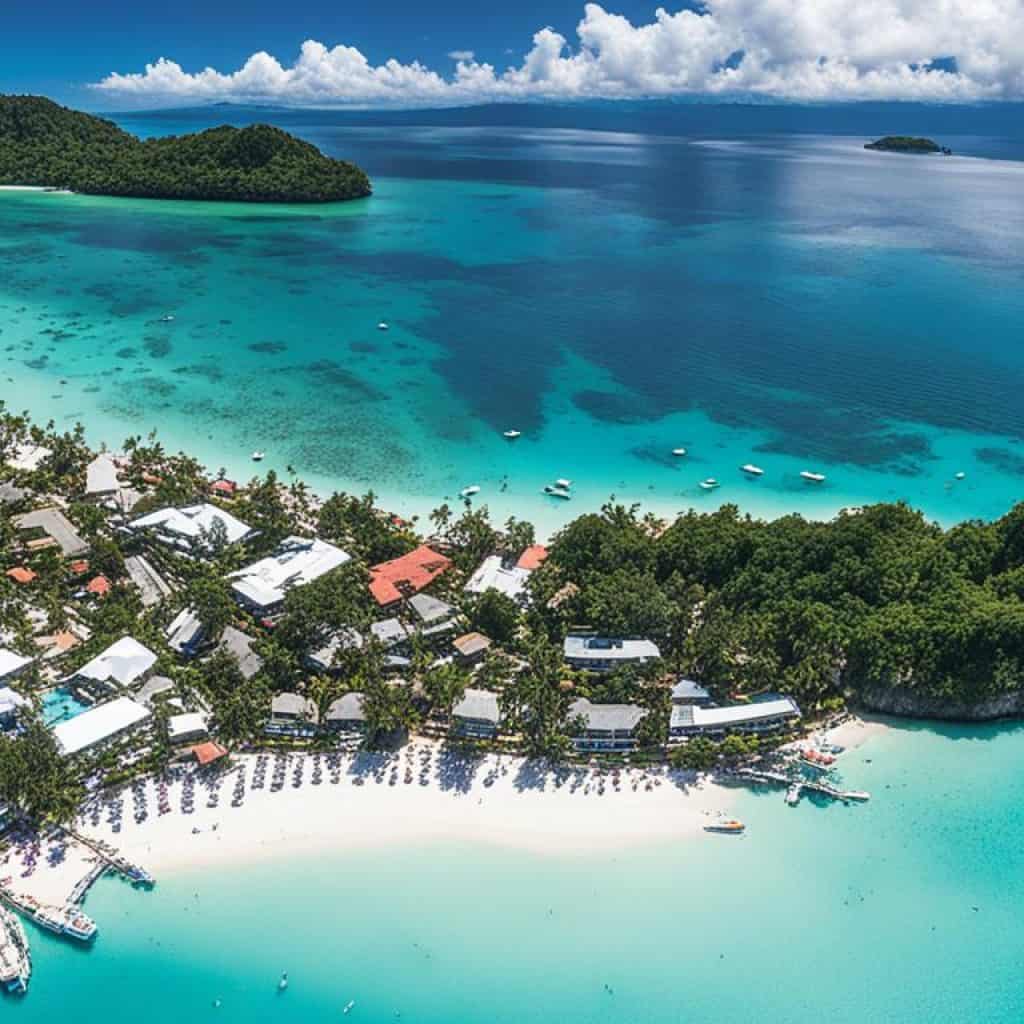
Conclusion
Boracay Island in Aklan, Philippines, is a tropical paradise that captivates visitors with its extraordinary beauty. The island boasts stunning white sand beaches, crystal-clear waters, and a vibrant cultural heritage, making it an irresistible destination for travelers seeking an unforgettable beach experience. From basking in the sun to indulging in thrilling water activities, Boracay offers something for everyone.
What sets Boracay apart is its commitment to sustainability and responsible tourism. The island has implemented various initiatives to minimize its environmental impact and preserve its natural wonders. Through the use of biodegradable products, the reduction of single-use plastics, and the promotion of eco-friendly transportation options, Boracay ensures that future generations can continue to enjoy its breathtaking landscapes.
Whether you’re looking to relax on its pristine shores, embark on adrenaline-pumping adventures, or immerse yourself in the vibrant local culture, Boracay has it all. From the moment you set foot on the island, you’ll be greeted with warm hospitality and a sense of tranquility that will stay with you long after you leave. Discover why Boracay is recognized as one of the world’s greatest places and experience the beauty of this Philippine paradise for yourself.
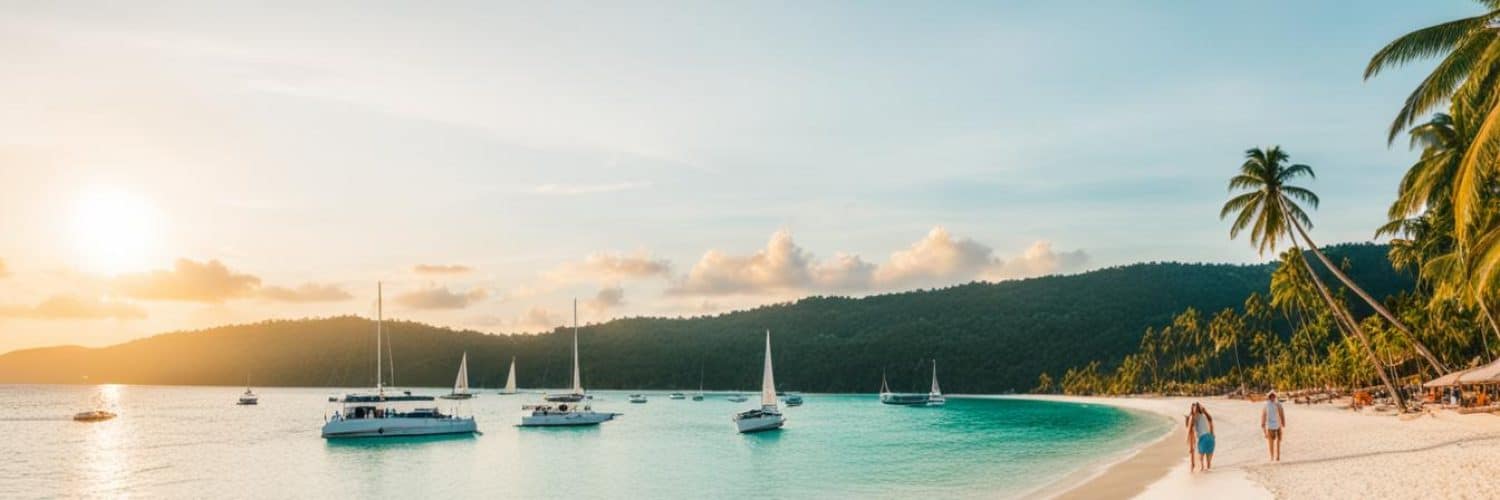
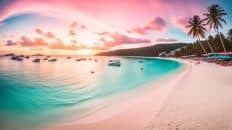
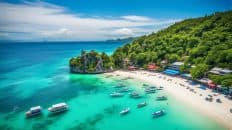
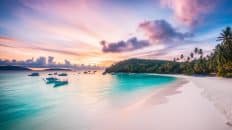














Add comment